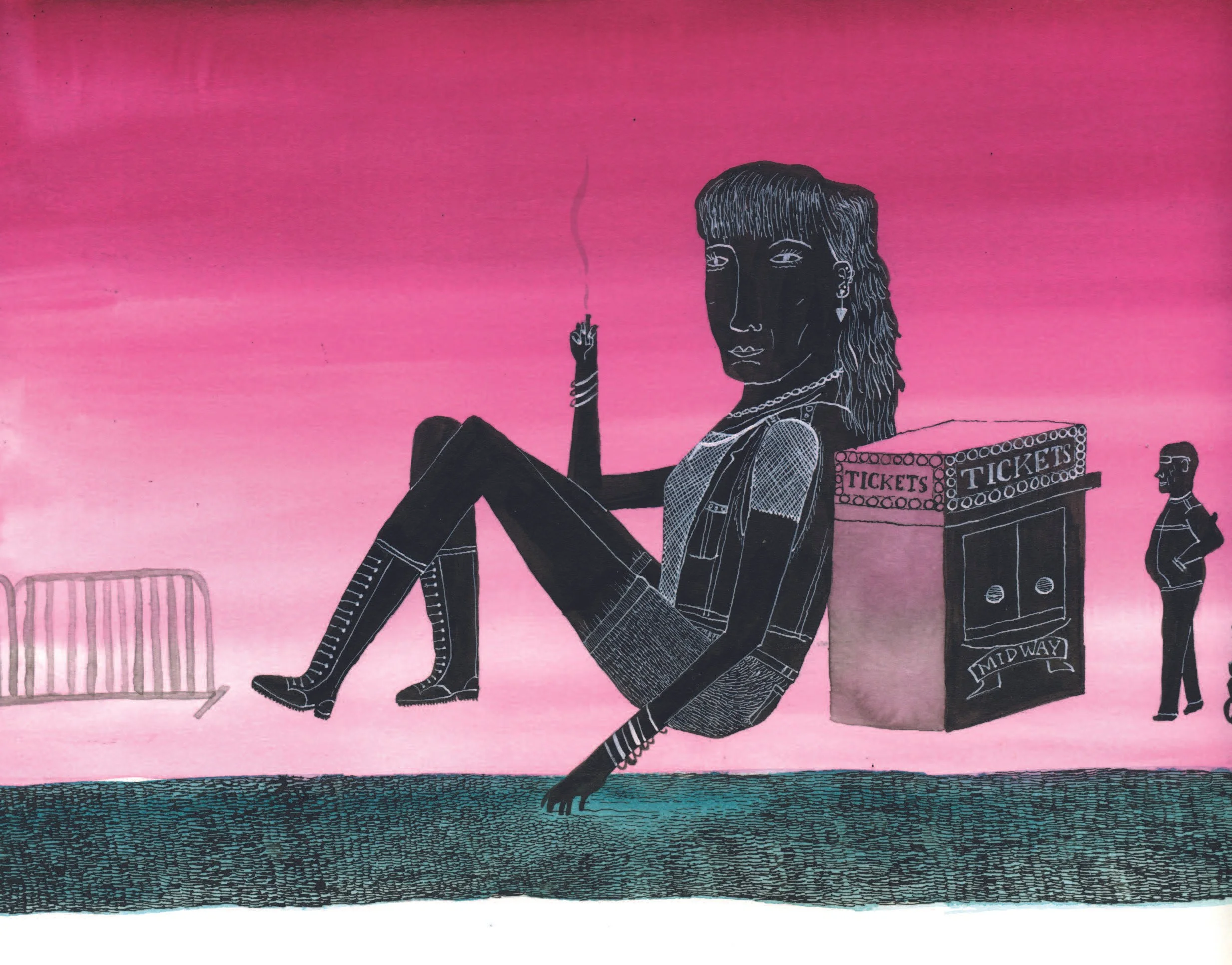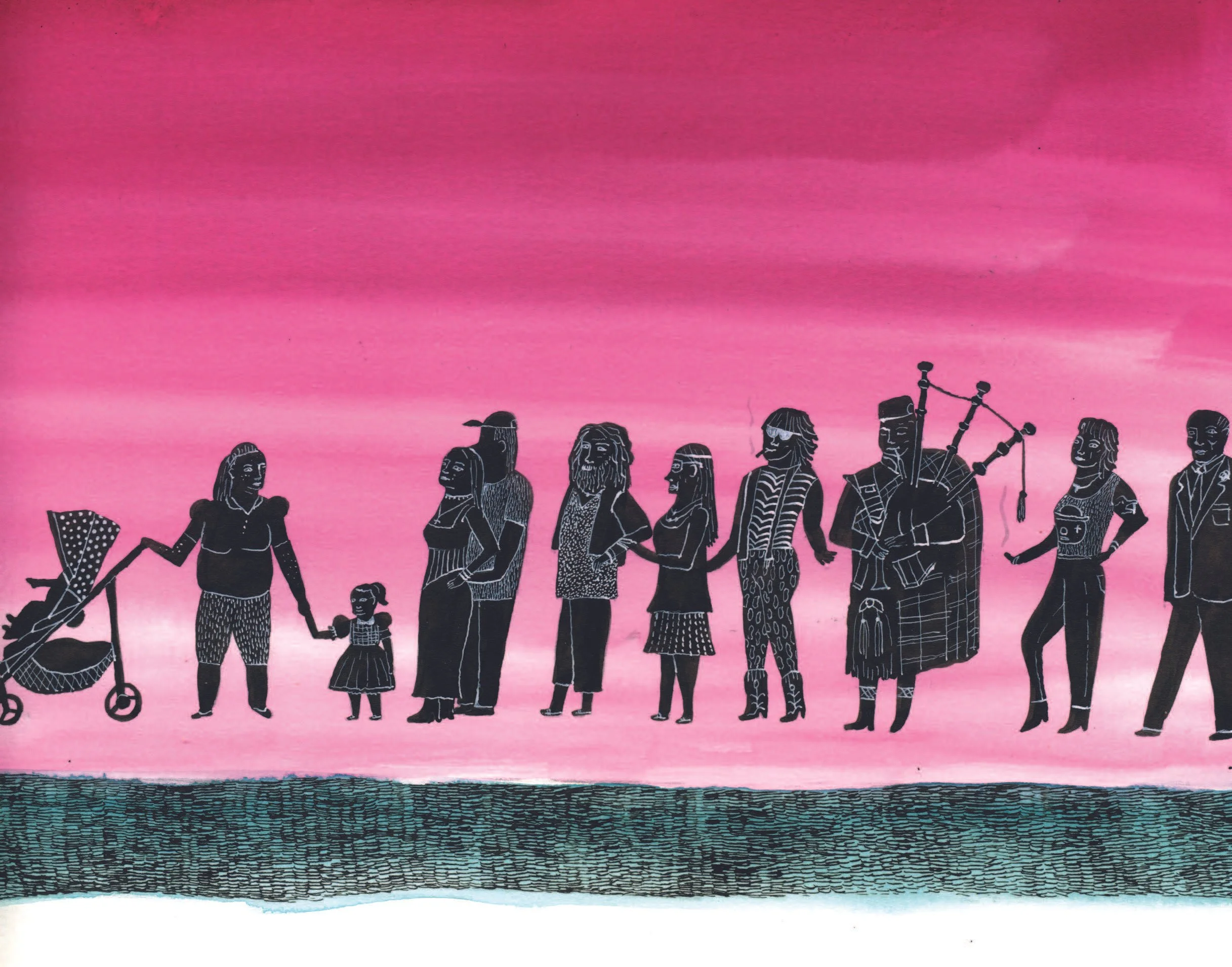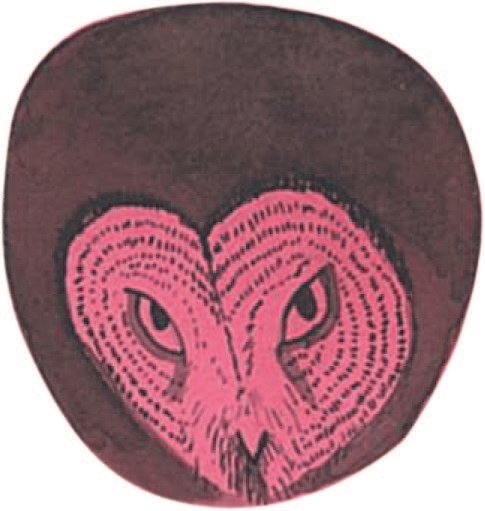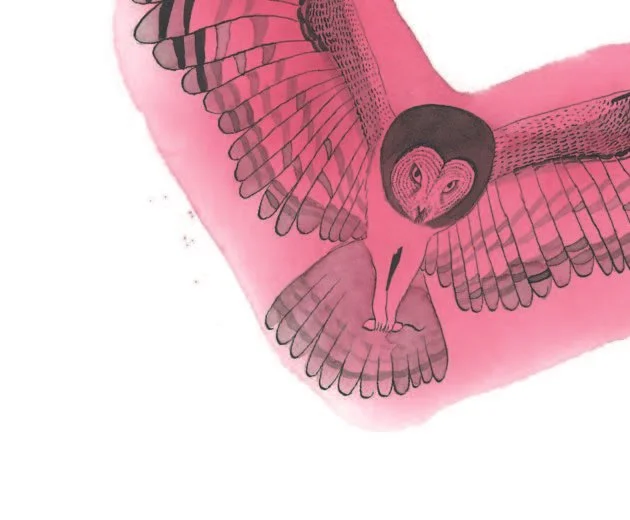The One Thing That Could Have Kept Me in Fort Erie, Ontario
Memoir by Amber Dawn
Illustrations by Marlena Zuber
The year I left Fort Erie, Ontario—a border town flanking the Niagara River—its population was just over 20,000. There’s still no movie theatre in my hometown. No chain coffee shops. Not one underground parking lot. The town library is a one-storey building (or two, if you count the sunken area where children’s story-hour takes place).
Fort Erie is big in other ways. It sprawls sixty-four hay-seedy square miles (103 kilometres). It can take half an hour to drive a car from one end of town to the other. Seniors, youth, and residents too broke to own a car—which is a fair number of folks—ride the FEPT: Fort Erie Public Transit or Fucking Excuse of a People Trolley as it is lovingly called by the townies. A single school bus, painted our official shade of royal blue, will pick you up just about anywhere from cow pasture to bingo hall between the hours of 7:30 a.m. and 7:30 p.m.
Fort Erieians can boast big backyards. Drag the lawnmower out of the garage in the morning and, by lunchtime, you’ve really earned that bologna sandwich and cold beer. My backyard spanned thirty-two acres of birch and cottonwood forest dotted with enough edible clover, choke cherries, and wild mushrooms that you could survive for at least a few days. Living off the land was something of a family value. The Vietnam war, the Summer of Love, and Canada’s then-Prime Minister Pierre Elliot Trudeau brought me to Fort Erie. Trudeau opened Canada’s gates to the US’s conscientious objectors to the Vietnam War, including my father, whose draft card was just about up. Ma and Pop met in 1969 and got married eight months later in Buffalo, NY. They drove across the Peace Bridge, signed some landed-immigrant documents at the border, and proceeded to an unspoiled stretch of land they and their hippy friends had optimistically purchased as a sanctuary for their turn-on, tune-in and drop-out dreams.
What my parents didn’t think through in their wonder years was how the fuck were they going to raise a teenaged daughter in the hellhole of Canada, a place where the top three activities for youth were fisticuffs in an empty lot, jumping off the train bridge into the rushing Niagara, or getting drunk on bootlegged gin, which the local bar-keeps would sell to any kid with allowance money. As in any riverside community, the Niagara propelled our stories, churned our small-town identities. As schoolchildren, we learned that the Iroquois—the First Peoples—called the river Ongniaahra: that which cuts the land in two. We were shown faded photos of horse ferries that really were powered by horses, each galloping alongside a wooden treadmill—town historians say those were tipsy boat rides. More harrowing still were the stories of the Underground Railway before the American Civil War. Thousands of enslaved Africans, with no more than the North Star to guide them, crossed the Niagara to whatever freedom Canada offered them. Our more progressive schoolteachers would take us on field trips to Freedom Park, where we would pray to God to end slavery forever, everywhere, Jesus for justice.
As high school students we studied pollution; the Niagara River had been listed as an “area of concern” since the early 1900s. In the classroom, we read reports aloud about how the loss and deformation of fish and wildlife was bad. But when hanging out down by the river, we all swapped funny stories about the rainbow trout that was a little too rainbow-coloured or the sheepshead fish that bayed and croaked throughout the night. We dared each other to chug river water with our beer. We took turns dunking our heads under water and keeping our eyes open until they burned. The Niagara River gave me my first orgasm, twelve miles from Devil’s Hole, where the rapids can trick even a strong swimmer under the surface. I was skinny-dipping, drunk under a low-slung Indian summer moon, and found a warm current passing between an outcrop of limey boulders. There I wedged my fifteen-year-old body, my hands free to go wherever they wanted in the privacy of the black water’s chop.
Across the river, the city lights of Buffalo winked at me: factories and freeways, nightclubs, art gallery steps, the illuminated rooftops of skyscrapers, and beyond Buffalo was Rochester, Syracuse, then New York, New York; bright lights, big city.
But I was stuck in Fort Erie. Endlessly tripping naked around the rocky riverbed toward the row of boys with whom I shared a bottle. Night after night I latched onto their dark silhouettes and fucked and felt nothing more than an affinity with their neophyte machismo. I fucked in the blind hope that my ever-growing feelings of displacement could be fucked out of me. It did not work.
“You should get a job,” my mother urged. She’d taken up the habit of looking into the distance when she spoke to me. She didn’t want to see my dyed red hair and the secondhand lingerie I wore as a sundress. But she held my hand like she always had; her square meaty palms bigger than mine no matter how old I got. “Soon you’ll graduate, then what?” she asked.
“Then I’ll leave and never come back,” I threatened.
“Well,” Ma sighed. “You’d better save some money then.”
I babysat and washed dishes at the Golden Palace Chinese Buffet, and a month after graduation (Class of ’92), I worked the ticket booth at a carnival midway.
Every year for four days—Canada Day to the fourth of July—Mather Arch Park turns into an outdoor concert hall and carnival midway in celebration of the friendship between the US and Canada. Town officials make speeches about the War of 1812 and bagpipes play. What the Friendship Festival is all about is treating droves of Americans to a cheap Tom Cochrane concert and late-night beer tent.
Ma saw the Help Wanted ad in the Gazette and drove me over to the park to stand in line with the rest of the teenagers and unemployed townies. A bleach-blonde in jean cutoffs handed me an application and a pen. “You sixteen?” she barked. “Gotta be at least sixteen.” I dug into my studded purse for ID, but she moved down the line before I had the chance to show it to her.
“They act like they give two shits, but they don’t,” said the man with a farmer’s tan, ahead of me in line. “‘Four-day idiots’ they call us, because we do all the brainless jobs. Then they move on and get a new batch of townies to do their grunt work. Boss pays cash under the table; that’s why we do this shit.”
The boss’s office was a dinged-up trailer with an eyeless clown painted on the side. The boss—a tall lanky man with a salt-and-pepper grey mullet—reviewed my application in less than three seconds. “Good with numbers?” He spoke in the same hurried bark as the blonde.
“Not bad.” I shrugged.
“It takes two tickets to ride the Zipper and I want to ride it ten times. It’s a dollar a ticket or fifteen bucks for a strip of twenty. What do you sell me?”
“A strip of twenty for fifteen bucks.” I squirmed in the plastic chair, second-guessing myself.
“Right. And I got a twenty-dollar bill?”
“So you get five back or pick up an extra five tickets and ride some other rides or something?”
“Ticket booth,” the boss mumbled.
“Ticket booth,” the blonde, suddenly at the door, echoed as she led me by the elbow out of the trailer and across the half-constructed midway. Twisted tracks of the kiddie-coaster lay in pieces in the grass. Flattened inflatable fun houses were sad multi-coloured puddles waiting for an air pump.
“This is booth number three beside the carousel,” said blondie, pointing at the motionless fibreglass horses. “Be right here at six o’ clock tomorrow, got it?”
The next day, I discovered that blondie’s name was Deb. Her bark had lengthened to a saccharine drawl—like a diner waitress in the movies—and marijuana perfumed her clothes. She unlocked the narrow back door of the orange shack that was booth number three. “This is it, honey,” said Deb, motioning at the two bar stools, two metal lock boxes, and a poster of David Lee Roth in snakeskin Spandex suit crammed inside the four-by-four-foot booth. She set me up with a dog-eared list of ticket prices, a calculator, and a cash float; new fives and tens spun through her vaudevillian fingers.
“You’re good to go,” she said slamming the cash box down on the tiny countertop. “Other girl gets here in half an hour. Show her what to do, okay, honey?”
Through the Plexiglas window, I watched Deb march across the grass, her backcombed hair bouncing with purpose. She weaved through the midway rides, neon lights flickered on in her wake, and by the time Deb finished her rounds, the entire park was a tizzied battle of classic rock vs. circus jingles, the alluring aromas of toasted caramel and corn dogs, and droves of hyper children hassling their parents for money. “Twenty tickets,” they shouted at me through the circular cut-out in the Plexiglas, their brats bouncing around them like popcorn kernels.
Just as I noticed my foot starting to tap in time to the vexatious tune of the carousel, the other girl Deb had mentioned came pounding at the door. I flipped open the rusty latch to find Gina Costa standing outside, her hand poised mid-air, ready to pound some more. She was my enemy. We’d never scrapped it out after school; I had enough sense to avoid all five feet, eleven inches and 170 pounds of her. But rumour had it that I was as good as toast ever since I’d made out with her gross ex-boyfriend at a bush bonfire party. We stood in silent deadlock for several long seconds. Mosquitoes buzzed past her through the open door and swirled around the flickering light bulb overhead. Bells frantically rung as someone won at the neighbouring duck-shoot game. Gina nervously bit her glittery lip-glossed lip, and I mustered the courage to say, “Whatcha going to do, throw down with me right here?” I turned my back to her before I had the chance to rethink my words. A crowd of eager kids was forming. As I slid the first boy his strip of tickets, Gina took her place on the adjacent stool.
The tiny booth was a tight fit for her, and she had to work pretty hard to keep her leg or shoulder from touching mine. She fussed with her spool of tickets as a few of the boys left my line and pressed themselves against her side of the window.
Gina was slow, or at least not as quick as I was with numbers. The solar calculator was nearly useless under the dirty low-watt bulb that hung above us. Maybe it was because I couldn’t stand the line-up getting too long, or maybe it was my way of offering the olive branch, but I found myself gingerly dropping into her transactions, whispering, “Ten even. Break open the roll of loonies. American money is on par.”
Apart from my muttered calculations, we did not speak until the very end of the night when Gina offered me a ride home. “Just don’t laugh at my dad’s heinous station wagon,” she said.
“Um.” The cashbox rattled in my hands. “My ma said she’d pick me up.”
“’kay,” said Gina. “See ya tomorrow, then.” After she left, I compulsively recounted quarters and dimes. Beside me the stamp of Gina’s thighs remained on the empty metal stool. I traced my index finger along the thin line of sweat where her inner tights must have been, then fought the unsettling urge to stick my finger in my mouth. This is my first memory of a long-standing obsession with the lovely perspiration prints sturdy girls who wear short skirts leave behind after sitting.
The next night, Gina and I were both itchy. Mosquito bites had claimed our bare legs and arms. “Quit scratching, you’ll make them worse,” I warned her. We spent our shift performing a pointless, jerky dance to keep Saturday’s batch of mosquitoes from biting. Gina slapped one from my thigh, hard. “Look,” she said, holding her hand up proudly, a smear of dead mosquito in her palm. “Gotcha!”
The night after, there were fireworks. With our foreheads against the Plexiglass, we struggled to see the red, white, and blue sparks just outside the view from the tiny booth window. I leaned back against the chipboard wall to see the bigger picture: a park full of people gazing up at the sky, couples—many couples—holding hands, girls with their heads tucked under their boyfriends’ chins, fathers hoisting toddlers onto their shoulders with one arm, their others clapped around their young wives. I couldn’t see what they were marvelling at; only the burned-out fireworks floated by my vantage point as grey swaths of smoke. Jimmy—a high school dropout who’d managed three dates out of me—was in the crowd with a tiny Goth girl hanging off him, and I bristled—not out of jealousy but from the thought that she was exactly what I must have looked like on his arm, a small, sloppy-drunk juvenile costumed in wannabe rebel’s clothing.
“I hate it here,” I told Gina.
“I don’t mind if you go outside for a bit. Watch the fireworks,” she offered.
“Not ‘in here’ in this booth. I hate the whole fucking town.”
She nodded in careless agreement and produced a twenty-sixer of cinnamon schnapps from her backpack. “Like my mom says, buonanotte al secchio.”
“I don’t speak la lingua.”
“It means ‘good night to the bucket,’ which means ‘we’re screwed.’”
“We’re screwed,” I toasted heartily, only to choke on my first sip.
“Don’t get us caught, stupid,” said Gina, snatching the bottle from my hands. Twisting her curvy weight, she squatted under the narrow countertop, out of site of the ticket window. I watched her throat quiver as she swallowed. A fat tear pushed itself out of the corner of her left eye. She pulled on my pant leg like a toddler and I squeezed down next to her on the booth’s grimy floor. The bottle clinked against my teeth as Gina thrust it at me. “Ouch,” I yelped and clapped my hand over my mouth.
“Baby,” she hissed, but she placed a finger on my lip as if to check for blood. A second finger met my lip, then my chin was in her hand. Gina took a long swig of schnapps, tilted my head back, and cupped her lips over mine. Red-hot liquid ran from her mouth into mine. For a moment her sun-freckled arms were around me.
And a moment later, we were back to peddling tickets. Money moved through my hands mechanically. Flashing lights and whistles flogged our booth, making me claustrophobic and dizzy. Later still, I lay awake in my bed, raking my teeth over my cinnamon-tingly lips.
Running away with a carnival was neither a childhood dream nor nightmare of mine. I’d simply overheard Deb say that the carnival was moving next to Tonawanda, New York, then leaving Erie County altogether for Pennsylvania, Ohio, and who knows where next. I took up my plea with Deb.
“You gotta take me with you. I can’t stay here one more day.”
“Who’s messing with ya? Is it your daddy?” Deb asked in a tone too casual for me to consider the appropriate reaction. I bowed my head and for a moment the trampled grass around my feet seemed to turn a devastating, electric green. Deb patted my shoulder. “I don’t know my daddy, but my mom had plenty of boyfriends. A-holes, every one.”
Deb marched me up to the boss’s trailer before my last shift started. It was the fourth of July—the busiest night at the carnival, and I knew the boss wouldn’t give us much time. “I just graduated with good grades. I can work pretty hard. And I’m already trained in the ticket booth,” I made my case.
“Her cash is never short. I’d trust her with bank runs if I had to,” Deb sided with me.
“Where she gonna sleep?” the boss asked Deb. “I already told her she could bunk in my trailer.
See how that goes,” Deb told him.
“We clock some long days,” said the boss, tap- ping a pen on his metal desk. “Get started before sun comes up some mornings. You gonna do that?”
“Sure thing,” I said.
“A girl, a young girl like you, especially wearing those kinda get-ups”—the boss motioned to my bare legs, the row of safety pins that hemmed my short, short skirt—“can get into a lot of trouble. Trouble we ain’t going to help you out with. Understand me?”
I nodded, coolly. I had already learned what the wrong side of the high school parking lot teaches. I already knew that no one helps girls with the kind of trouble we get into. But then I looked at Deb—the only woman carnie in the crew—with her ratted bangs that hung in her tired eyes. Her arms were always folded in front of her chest, her foot, always nervously tapping. Besides her sabre-toothed tiger tattoo, she was no different than the hard-bitten women who drank at the local bar in Fort Erie.
“Well, you’ve been warned. I suppose home is always just a bus ticket away,” said the boss.
With that, Deb took a Polaroid picture of me holding my birth certificate and CareCard, and I was officially a carnie, like her. “If you really want to do this, you be here by six a.m. tomorrow. Not a moment later.”
After our shift, Gina and I ran for the Zipper, the ruthless king of midway rides. We’d spent nearly twenty-four hours at the carnival and hadn’t gone on a single ride ourselves. “You girls are lucky. Last ride of the night goes to you,” said the operator.
“Yeah, thanks. The Zipper is my favourite.”
Gina stuck her chest out as she spoke to him. It made me want to punch the carnie in his bearded face. He leered at her again as he checked the safety bar across our chests. He closed the heavy screen door and gave our cart a forceful push that sent us spinning upside down. The Zipper started with a beastly groan, and Gina and I grabbed each other without a thought of shyness. Her scream started off as rich and high as that uttered by the first slut to die in a slasher B-movie, but gave way to wheezing as we were tossed around in our metal cage. Her dry mouth met mine and we kissed clumsily until the Zipper groaned to a stop. The kiss was real this time. Even though we said nothing, we both knew it was real. I confessed to Gina that I’d be travelling on with the carnival. “Well, at least let me give you a ride home,” she said finally.
I wanted to hold her hand as we crossed the midway toward the parking lot. Already the carnival was being torn down. The Fun House was being folded into wooden cargo boxes. Stray carousel horses lay on the dark lawn.
“My dad’s car,” Gina explained again, crinkling her nose up at the old station wagon with faux-wooden paneling. Some of the wood-grain veneer was peeling off around the edges. The hub caps were missing. Inside, the chocolate brown upholstery smelled faintly like feet.
Gina drove the back roads where few streetlamps punctuated the night. There was the smell of sumac growing along the ditch, the sound of gravel pelting her back bumper, the occasional squeak of Gina’s thighs against the vinyl seat.
“You’re really going with the carnies?” she asked me.
“Ah, I don’t know. They’re creepy, right? But it’s a way out of here.” Like my parents had done twenty-some odd years before, I was ready to cross that border and never look back. Do you want me to stay, Gina? was the question caught on my tongue, and an older, braver me would have asked her. Instead I chattered away in teenage idiocy. I was still turning out some dumb response when Gina slammed on the breaks.
In the centre of the potholed road stood a barn owl, its white wings stretched out, challenging Gina’s car, a small and mangled rodent in its claws. Screech owls, they’re called in Southern Ontario; like the coyotes and night frogs, you can hear their strange sermons only after dark, but you rarely see one up close. But there was its heart-shaped face. Its moony eyes reflected the high beams. We held our breath. It flew off, and the night seemed all the blacker.
If there was uncertainty in Gina’s eyes as I eased her T-shirt over her head, I could not see it. The freckles on her breasts, baby hairs below her belly button, birthmarks, scars, the colour of her nipples, I saw none of these. Just darkness. Small-town darkness. She said, “Oh,” and “This is crazy. This is crazy.” I didn’t need light for my hand to find its way into her cotton underwear. We didn’t need words to know that only once in the bucket seat of her father’s car was all we had.
Gina became a bank teller in downtown Fort Erie, had two kids and a husband before the age of twenty-two and now owns a house with a big backyard.
And me, I put in time with the carnival, then hitchhiked some, hopped a train once. The world soon proved that it was not so small. In turn, my young heart soon proved to hold more than wild angst and trouble. It took many women to teach me this lesson: how love can open you, lay you wider than dawn’s horizon line. How the desire to find each other leads you forward. It is a road I doubt I’ll ever quit traveling. »




